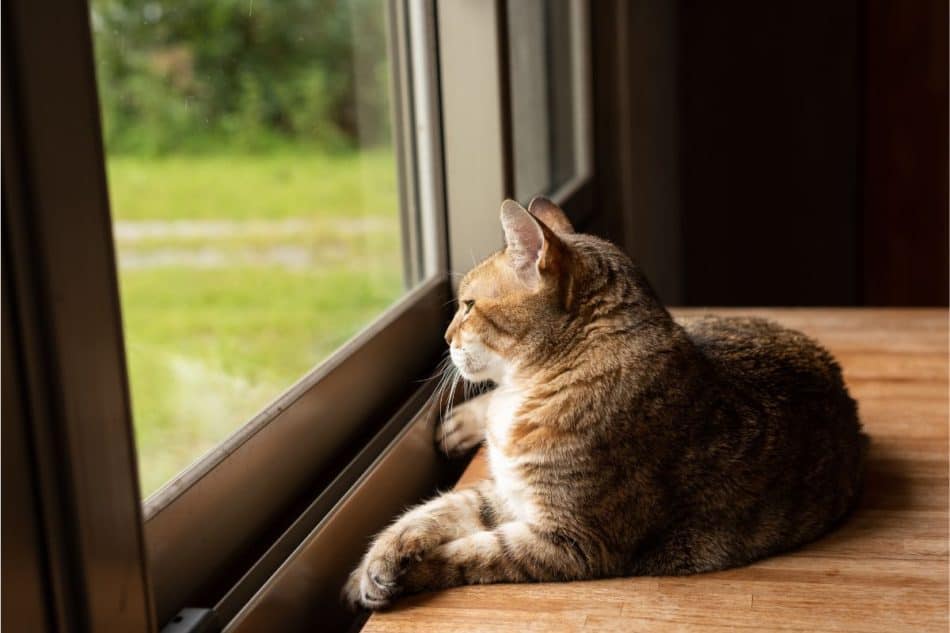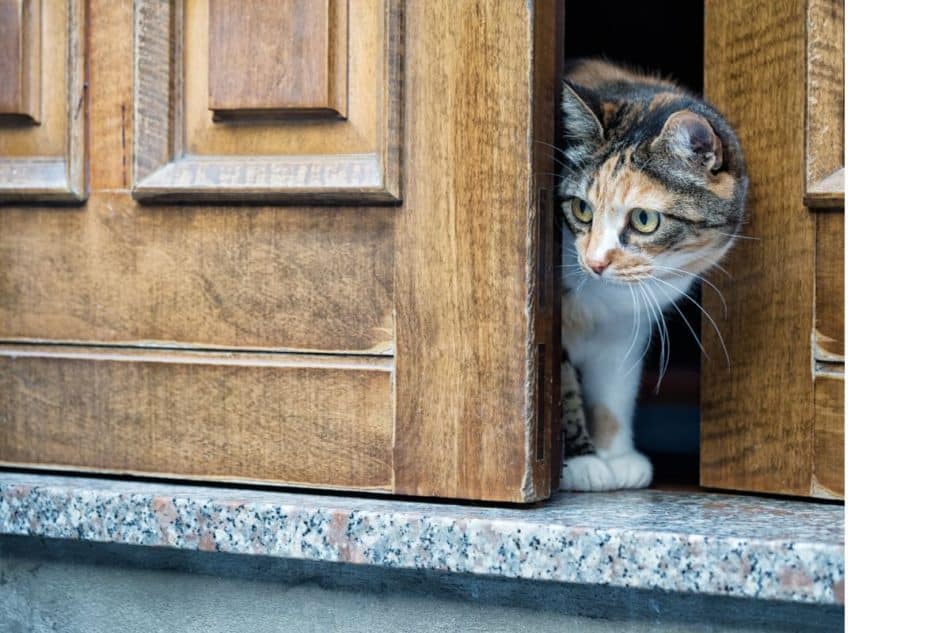In my earlier years of living with cats, we had some indoor cats and some outdoor cats.
Later on, we decided it was best that our cats were always indoors.
We came to that conclusion because of all of these bad things that could happen to a cat when allowed outdoors:
Table of Contents
Bad Things That Can Happen to a Cat Outside
- get hit by a vehicle
- be injured in a fight with another cat
- be attacked by a dog, coyote, or other large animal
- get lost
- be abducted
- get infested with fleas, mites, or ticks
- contract a disease
- climb a tree or pole and not be able to get back down
- be exposed to pesticides, herbicides, or automotive fluids
Any of these misfortunes could happen within the span of a few minutes, so your cat does not have to be outside all day to be exposed to one or more of these risks.
Why Indoor Cats May Want to Go Outside
Our domestic cats are not far removed from their wild ancestors. An interesting study by researchers at the Washington University School of Medicine found that there is very little genetic difference between Domestic Cats and Wildcats.
Cats simply did not evolve significantly following “domestication” the way dogs did.
If a housecat is permanently returned to the outdoors to fend for themself, the cat will most likely take up hunting and following the instincts of their wild cousins.
Since some cats may think they can follow their ancestral instincts better if they are outside, this can pose a challenge to you if you want your pet to be an inside cat.
Nevertheless, being outdoors may not be a good place for them to be.
Do All Cats Want to Go Outside?
If you share life with a cat that has a calm demeanor and does not seem driven to hunt, the decision to keep your cat indoors is probably easy. Your kitty may have very little interest in going outside.
If you live with a cat who you rescued and who seems determined to go out, that decision may be somewhat more difficult.
The degree to which a cat may be interested in going out, if interested at all, will surely vary with the nature and background of the cat.
Some cats will be perfectly satisfied to observe the great outdoors without having to actually go outdoors, like this kitty here:

If on the other hand, if you have a cat who tries to bolt out the door whenever you attempt to go out or come in, then you may need to do some things that might discourage that behavior if you want to keep your kitty inside.
How to Motivate Your Cat to Stay Inside
Cats need to act out those feline instincts that remain a part of them even if they are well-fed and enjoy a comfortable indoor life. If a cat’s innate instinctual urges are satisfied while they are inside, they may not be so anxious to go outside.
Here find some suggestions for providing your kitty with behavioral outlets that may help them to be the cat they were born to be without having to go outside:
- To satisfy their need to attack prey, toys might provide an outlet for this instinct. See my blog post How to Choose Cat Toys for help picking out a good toy for your kitty.
- To satisfy their occasional need to hide out, covered cat beds might work for them. You can find great information on this when you visit my blog post 5 Tips on How to Choose a Cat Bed.
- To relieve their scratching impulse, some scratching posts would be good to give them an alternative to the furniture.
- For their need to climb, cat trees provide a safer choice than the top of the refrigerator. For help getting a good cat tree, visit my blog post How to Choose a Cat Tree.
- Access to a window to look out of might relieve their inclination to watch and then stalk prey.
No one can guarantee absolute results, but these are actually things you ought to do for your cat anyway.
Should I Microchip My Indoor Cat?
Even if your cat is intended to be always indoors, and even if your cat seems perfectly happy with that arrangement, there still remains the possibility your cat could somehow end up outside. Here are a couple of examples:
The transportation escape
For example, let’s say you are to take your pet to a veterinarian appointment. You have your kitty in a cat carrier and you are walking to your vehicle.
Not realized by you, the door to the carrier did not lock properly. The door pops open, your kitty escapes the carrier, panics and runs away.
Unintentionally your indoor cat is now outdoors, and perhaps run off to who knows where.
How to Choose a Cat Carrier is a blog post I published that you may wish to take a look at.
The incidental doorway escape
For another example, suppose you have contractors at your residence doing some work inside your house. They are coming and going through the front door, perhaps bracing the door open to bring in equipment.
Your cat is frightened by strangers and confused about these people the kitty is not familiar with. Your cat is in escape and hide mode, and feels driven to find somewhere to take refuge.
The door is open, so your kitty slips out the door.

The conclusion:
Unexpected things happen, so why take a chance? If your cat is microchipped, you have done something to increase the chances you will find your missing kitty.
Where Can I Get My Cat Microchipped?
Veterinarians typically offer microchip services, as do some animal shelters.
According to information on the Humane Society of The United States website, the veterinarian or technician will inject a microchip just under your kitty’s skin between the shoulder blades.
The microchip is about the size of a grain of rice. The procedure is described as being similar to administering a vaccination, and does not require anesthesia. The microchip is intended to last for the lifetime of your cat.
Your contact information will need to be registered with the microchip company. The vet or shelter personnel will perhaps assist you with this. You do need to be sure to get your information registered with the microchip company whether you receive assistance or not.
Should your lost kitty be found by someone and taken to a vet or a shelter, either of those will hopefully have a scanning device that will reveal the necessary information on how to contact you.
Even though there are multiple microchip companies operating on different scanner frequencies, there are universal scanners that can read various frequencies.
Please understand the microchip is not a GPS device. Unlike your cell phone, there is no technology in the microchip that will track the whereabouts of your pet. Your cat must be found and the microchip scanned for this system to work.
If your cat is found and has no microchip, the rescuing party may not be able to find you, and your kitty could end up in a shelter.
Should I Let My Cat Decide About Going Outside?
Generally, I think you should pay attention to what your cat is trying to tell you. In fact, I wrote multiple blog posts about communicating with your cat. How to Read Cat Body Language is one of those posts.
Whether they are communicating with their eyes, their meows, or their gestures, you should pay attention to them and do your best to respond to their requests.
However, please remember that cats do not always make good decisions about whether or not to do a certain thing. A cat that gets up to the top of a kitchen cabinet is behaving in an unsafe manner.
An inside-only cat who is anxious to get outside is letting their wild instincts cloud their good judgement. They are just not taking into consideration the perils that are listed at the top of this blog post.
You should be the decision-maker about this, not your wild and crazy cat.
How to Create a Great Home for Your Cat
For more information about creating a great home for your cat, see my blog post Living With Your Cat.
